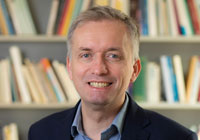
Photo credits:
Danish Saroee
Tomasz Zarycki
Johan Peter Falck Fellow, SCAS.
Professor of Sociology, University of Warsaw
Tomasz Zarycki has a degree in social geography from the University of Warsaw. He holds a PhD
in sociology from University of Silesia, Katowice, and a “habilitation” degree from the Institute for
Philosophy and Sociology of the Polish Academy of Sciences. Currently he is Professor of Sociology
at the Robert Zajonc Institute for Social Studies, University of Warsaw. His main fields of interest
include the sociology of politics, culture, knowledge and memory as well as the social and political
geography of the countries of Central and Eastern Europe, with particular emphasis on Poland and
Russia. He works mainly within the paradigm of critical sociology, relational sociology in particular,
and is inspired by the works of Pierre Bourdieu. His research focuses on the issues of elites, political
cleavages in Poland and other countries of Central and Eastern Europe, discourse theory, as well as
the critical and historical sociology of science.
Zarycki’s latest book in English is Ideologies of Eastness in Central and Eastern Europe (Routledge,
2014). His other books include: Gra peryferyjna: Polska politologia w globalnym polu nauk społecznych
(A Peripheral Game: Polish Political Sciences in the Global Field of Social Sciences, co-authored with
Tomasz Warczok, 2016, in Polish), Totem inteligencki: Arystokracja, szlachta i ziemiaństwo w polskiej
przestrzeni społecznej (An Intelligentsia’s Totem: Aristocracy, Nobility and Landowners in the Polish
Social Space, co-authored with Rafała Smoczyński, 2017, in Polish). He has held visiting positions at
several institutions, including Lund University, University of California Los Angeles, University College
London, NIAS Wassenaar, University of Strasbourg and EHESS.
During his stay at SCAS, he will work on the history Polish social sciences from the perspective of global,
relational sociology, with a special focus on the field of Polish linguistics and literary studies.
This information is accurate as of the academic year 2020-21.






